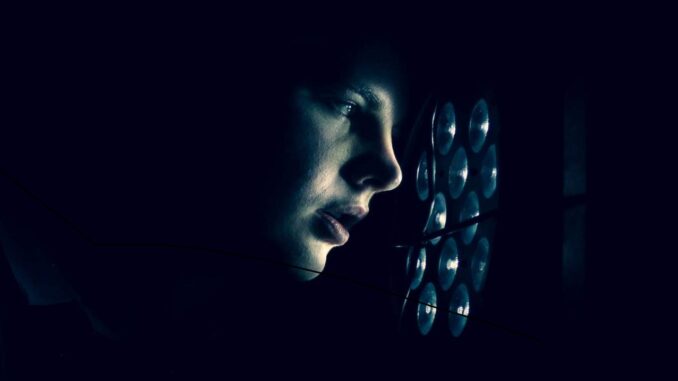
[In Space No One Can Hear the Smiths]
It is a testament to the show that David Bowie is a more subject of conversation and debate, but the song that is played is not Space Oddity.
Written and directed by Luke Thornborough, Alone is a sci-fi drama about two astronauts on a return flight from a mission to a distant world that might hold the key to reversing climate change back on Earth.
Set in the control centre of a spaceship, the play is a contest of wills, ideologies and musical preferences between Taylor (Kat Glass), the scientist in charge of the mission, and Holland (Courtney Bassett), the pilot who is responsible for getting them home.
When the ship suffers a collision, the pair are forced to confront what really matters to each of them.
Like all good science fiction stories, Alone is about something deeply human: faith, and the human need to create order out of chaos.
While it is framed in religious terms, faith comes in many forms – in the equipment keeping them oriented and alive; in the potential of their research to save the human race.
Both characters have had to jump through multiple hoops in order to get where they are. Without being explicit, both characters’ struggles are defined by entrenched patriarchy – it is a depressing reflection of how existing power structures have impeded progress, and pose an existential threat to everyone.
Despite being set in the future, the threat is no different than now – the only development is that climate disaster has reached near-apocalyptic proportions. As Taylor repeatedly points out, those who would resist change to prevent climate change have simply moved the goal posts.
One depressing revelation is that the mission is not even a priority – authorities on Earth have given up trying to save the planet, and have put their hopes in colonisation of other planets.
These two characters are alone in more ways than one.
One of the pleasures of this production is its evocation of a wider world. A lot of this future is sketched through the characters’ dialogue, but this world-building is also supported by other elements of the production.
Courty Kayoss’s costume design is utilitarian and feels indebted to the ‘used’ aesthetic of seventies sci-fi movies. It is a great stylistic choice since it reinforces the sense of history to characters who have been stuck together for years. Set design, also by Courty Kayoss, is just detailed enough to suggest the complications of a ship’s life support systems, and just limited enough in terms of space onstage to evoke the character’s increasingly limited options for survival.
Michael Goodwin’s lighting complements the set, slowly fading over the course of the show.
While there are occasional voice calls from Phil, at Mission Control (voiced by Steve Austin), the play rests entirely on the shoulders of Glass and Bassett.
Terse and empirical, Holland comes across as rather brash and straightforward. Bassett’s dry and understated approach complements Glass’s more exposed Taylor. Ultimately, it is a slow burn of a performance, as Holland tries to keep on top of an increasingly impossible solution.
Taylor, a scientist with religious faith, sees no contradiction between her role and beliefs. Glass gives Taylor a humour and passion that are slowly stripped away as the ship falls apart, and her faith in God is whittled down to something more egomaniacal.
The two performers have a lived-in rapport, with an intimacy and awkwardness that suggests both their physical familiarity and reticence to reveal the most vulnerable aspects of their interior lives.
Despite the bleakness of the scenario, Alone ultimately carries a flicker of hope – a faith that somehow, some way we can learn how to save ourselves.
Alone plays Loft at Q Theatre 16-18 February, 2023.




Leave a Reply